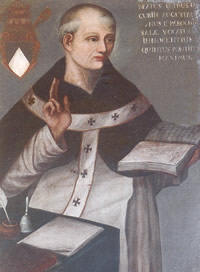 Peter
of Tarentaise was born in Savoy, probably in 1225, of noble and
wealthy parents. He grew up good-looking and bright. While still
a youngster, he abandoned wealth and position to enter the Order
of Preachers. These were stirring times in the intellectual life
of Europe and the Dominicans were in the van of progress. To
Paris, the thought capital of medieval Europe, went the young
Peter to study under St. Albert the Great, and to become a
master in theology and a colleague of St. Thomas Aquinas. He
wrote much. Indeed his busy pen got him into trouble. His
writings were attacked as unsound; but a colleague, quite
possibly great Thomas himself, came to his rescue and defended
his orthodoxy.
Peter
of Tarentaise was born in Savoy, probably in 1225, of noble and
wealthy parents. He grew up good-looking and bright. While still
a youngster, he abandoned wealth and position to enter the Order
of Preachers. These were stirring times in the intellectual life
of Europe and the Dominicans were in the van of progress. To
Paris, the thought capital of medieval Europe, went the young
Peter to study under St. Albert the Great, and to become a
master in theology and a colleague of St. Thomas Aquinas. He
wrote much. Indeed his busy pen got him into trouble. His
writings were attacked as unsound; but a colleague, quite
possibly great Thomas himself, came to his rescue and defended
his orthodoxy.
Peter proved to be no ivory-tower scholar. A born ruler of
men, he served with distinction as prior provincial of the
French Dominicans, then as vicar general of the Order. In 1272
he was made archbishop of Lyons and cardinal. The very next year
Pope Gregory X chose Lyons as the site of a general council of
the Church. Naturally preparations for the great event kept the
archbishop busy, and once the council convened, Peter was in the
thick of things. He worked much with St. Bonaventure, and when
the lovable Franciscan died, Peter preached his eulogy. He had
the consolation of baptizing one of the Tartar envoys to the
council. He worked hard and with great joy for the reunion of
the Eastern Church.
After the council, Peter's reputation stood high, and when
Gregory X died in 1276, the cardinals thought at once of the
charming and capable archbishop of Lyons. He was elected on the
first scrutiny.
Peter took for his name Innocent V and for his motto: "My
eyes are ever toward the Lord" (Ps. 24:15). He might well have
taken "Blessed are the peacemakers," for bringing peace was his
favorite task. As archbishop he had put an end to strife between
the episcopal palace and the citizens. He had soothed King
Philip in a dispute over temporal jurisdiction. He had been
instrumental in promoting good relations between the friars and
the secular clergy. Now as Pope Innocent he continued this
Christlike work. To Genoa, torn with civil war, the Pope sent a
letter pleading for peace, and it was consolation to Innocent
that on his deathbed word was brought of his success. He removed
an interdict from Florence. He strove to keep peace between
Emperor Rudolph and the ambitious Charles of Anjou.
Though a man of peace, Innocent was keenly alive to the
plight of Christians face to face with the menace of Islam. He
sought help for the Spaniards who were having another tussle
with the Moors. He urged Philip of France to lead an army to the
Holy Land where the old crusaders' kingdom tottered on its last
legs.
But his brilliant career was abruptly cut off. Innocent V
died after a short illness on June 22, 1276.
Excerpted from "Popes
Through the Ages" by Joseph Brusher, S.J.

